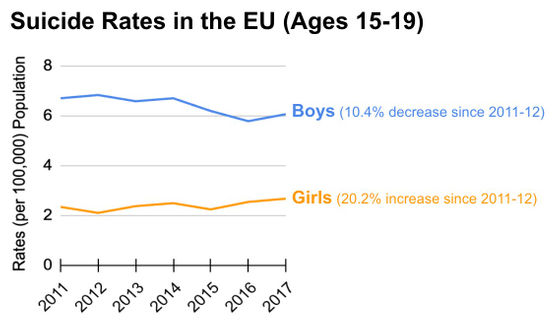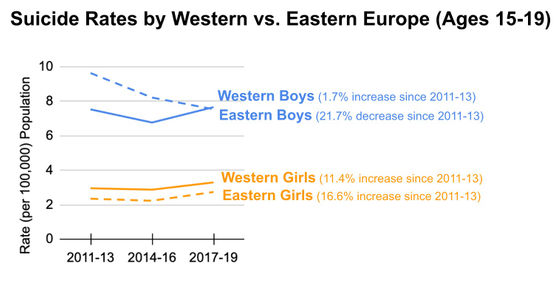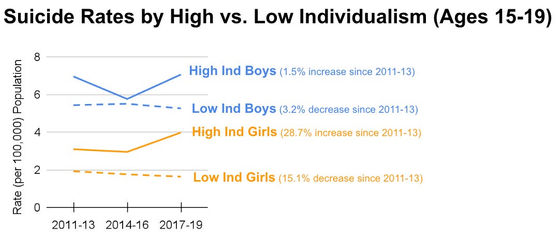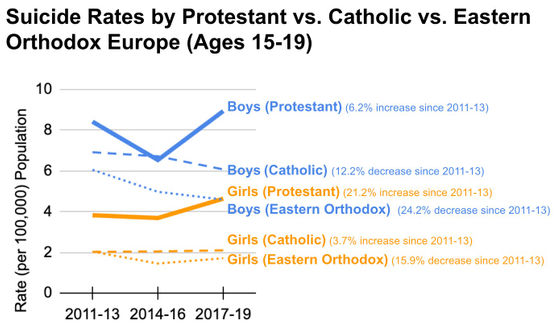'The spread of smartphones is putting the mental health of young people in Europe at risk,' says study

Since the 2010s, when smartphones began to become widespread, it has been reported that the rates of depression, anxiety, self-harm, and suicide among young people have increased worldwide. A similar situation is occurring in Europe, and the foreign media
The Youth Mental Health Crisis is International Part 4: Europe
https://www.afterbabel.com/p/international-crisis-europe
After Babel used data from the Health Behaviour Survey of School-Age Children (HBSC), an initiative that has been running since 2002 to monitor the physical and mental well-being of thousands of adolescents aged 11, 13 and 15 in 51 European countries.
The HBSC includes four questions about psychological distress: 'Do you sometimes feel depressed?', 'Do you sometimes feel nervous?', 'Do you sometimes feel irritable?', and 'Do you sometimes have trouble sleeping?'. Respondents of the HBSC evaluate their own state over the past six months for these questions on a five-point scale: 'Every day,' 'At least once a week,' 'Once a week,' 'Once a month,' and 'Rarely/Never.' After Babel defines participants as having 'high psychological distress' if they answered 'Every day' or 'At least once a week' to three or more of the four questions in the past six months.
Using this scale, After Babel calculated the average psychological distress scores of young people living in Europe by gender in 2002, 2006, 2010, 2014, and 2018. The survey results showed that the average psychological distress score of young people in Europe was stable from 2002 to 2010, but has been increasing since 2010. It also revealed that girls are more likely to report psychological distress.

After Babel further disaggregated the mental health of young people in Europe. By region of residence, the study found that young people in Eastern Europe were more likely to report psychological distress than those in Western Europe. It also found that since 2010, young people across Europe have become more likely to report psychological distress, with the largest increase among girls in Western Europe.

Previous

After Babel also investigated '

These findings reveal that girls living in wealthy, economically equal societies in Europe have seen their mental health decline fastest since 2010. However, there is little evidence to suggest that increased wealth or reduced inequality is the cause of worsening mental health. Agter Babel therefore further investigated the cultural variables ' individualism ' and religiosity, which are known to have a large influence on society.
According to After Babel, in less affluent countries, individuals tend to work for the solidarity of the group and neglect their own desires and personal projects, which weakens the tendency towards individualism. On the other hand, in wealthy countries, daily needs are easily met, and as economic stability increases, people have more time to enjoy leisure. In addition, because the government provides a lot of support to individuals, it becomes easier for them to separate themselves from the large groups and communities to which they belonged at birth, which results in individualism.
Until now, individualism has been perceived as 'enhancing happiness because it allows people to enjoy freedom,' but since 2010, this trend has begun to change among young people. With the rapid growth of technology, while the time spent individually has increased, the time young people spend interacting face-to-face with others has decreased significantly. As a result, it has been pointed out that this may be leading to poor mental health among today's young people.
To investigate the relationship between individualism and young people's mental health, After Babel analyzed trends in psychological distress among young people in countries with high and low individualism scores in Hofstede's Six-Dimensional Model . The results showed that before 2010, young people in countries with a high individualistic tendency had better mental health than young people with a low individualistic tendency, but that this trend no longer held true between 2010 and 2018.

In addition, After Babel also investigated 'religious views,' which are predicted to keep young people's mental health in good condition. The results of the survey on trends in psychological distress associated with high and low levels of religious faith are as follows. As with previous comparisons of GDP and individualism, the mental health of young people, which was stable before 2010, has rapidly deteriorated since 2010.

Similarly, After Babel looked at differences between Christian Protestants, Catholics, and Eastern Orthodox Christians, and found that mental health among adolescents has deteriorated most rapidly since 2010 in Protestant groups.
In addition, After Babel analyzed data released by

The study also found that suicide rates among young people in Eastern and Western Europe have declined among boys in Eastern Europe, while rates among boys in Western Europe have remained roughly stable. The suicide rate among girls has remained roughly the same in Eastern and Western Europe throughout the 2010s, with both showing a slight increase since 2011-2013.

Furthermore, it has been shown that suicide rates are increasing among girls in more individualistic countries, while they are decreasing among girls in less individualistic countries.

Below is a graph showing suicide trends in Protestant, Catholic and Eastern Orthodox European countries since 2011. It shows that suicide rates have increased in the 2010s among young people in Protestant countries.

Based on these survey results, After Babel pointed out that 'with the spread of smartphones since 2010, the society surrounding young people has transformed from real-world communities to online networks, resulting in the collapse of self-awareness and community consciousness.' On the other hand, they speculate that 'young people who live lives rooted in real-world communities where different generations coexist, such as family, neighborhood relationships, and religion, have been protected to some extent from social change.'
'We are in the midst of arguably the largest and most rapid social transformation in human history, driven by the rise of smartphones. Our research shows that countries that place a higher value on real-world groups and obligations are more likely to protect their children from this transformation,' After Babel said.
Related Posts:
in Science, Posted by log1r_ut







